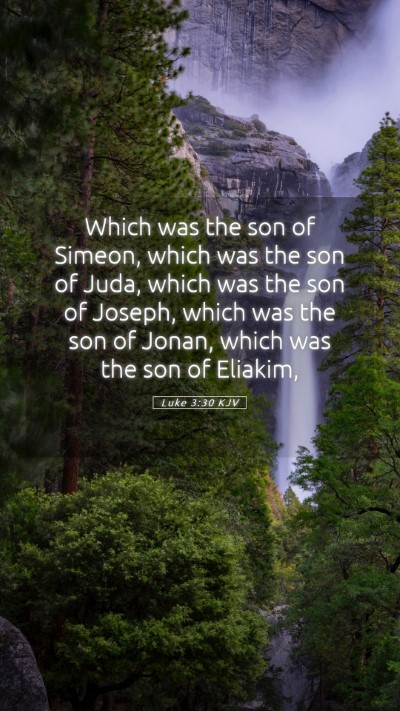Bible Verse Commentary on Luke 3:30
In this passage, Luke 3:30, we encounter a significant moment in the genealogical presentation of Jesus. This verse is often cited in discussions about the lineage and rightful claim of Jesus as the Messiah. Understanding this verse requires delving into its context and the various layers of meaning it presents.
Overview of the Verse
Luke 3:30 states: “The son of Simeon, the son of Levi, the son of Melchi, the son of Addi, the son of Cosam.” This genealogical detail may seem straightforward but provides critical insights into Jesus' identity and role within the broader narrative of Scripture.
Insights from Public Domain Commentaries
-
Matthew Henry:
Henry emphasizes the importance of lineage in the Jewish tradition. He suggests that tracing Jesus' genealogy back to significant figures enhances the understanding of His Messianic claims. Henry points out that genealogy serves both as a legal right to claim the throne of David and as a fulfillment of Old Testament prophecies concerning the lineage of the Messiah.
-
Albert Barnes:
Barnes provides an analytical view by examining the names mentioned in the genealogy. He notes that while the names may not be familiar, each name represents a person with a story that contributes to the unfolding narrative of redemption. Barnes highlights that Luke’s account addresses a primarily Gentile audience, presenting Jesus as a relatable figure whose lineage is connected to various historical and religious backgrounds.
-
Adam Clarke:
Clarke offers a thorough examination of the text and suggests that such genealogies serve to demonstrate God’s faithfulness over generations. He interprets the listing as a means of affirming Jesus’ authenticity and divine ordination. Clarke also points out that while the genealogy appears technical, it carries profound theological significance, linking Jesus with the hope of Israel.
Historical and Theological Context
To fully appreciate the meaning of Luke 3:30, one must consider the historical context in which it was written. The early Christian community was in a critical phase of defining Jesus' identity amidst various beliefs and claims. Genealogy played a vital role in establishing credibility and fulfilling prophecies noted in the Old Testament.
Application and Significance
Understanding this verse is critical for several reasons:
- It highlights the Jewish customs surrounding genealogy and the expectations for the Messiah.
- It serves as a reminder of the continuity of God’s plan through history, evidenced in Jesus’ lineage.
- For contemporary readers, it reinforces the idea that Jesus’ coming was not a random event but a planned fulfillment of prophecy, which can bolster faith and understanding in Bible study groups and personal reflections.
Related Biblical Cross References
- Matthew 1:1-17: The genealogy of Jesus through Joseph, pointing to his royal lineage.
- Romans 1:3: Reflects on Jesus' descent from David according to the flesh.
- Isaiah 11:1: A prophecy concerning the lineage of the Messiah, emphasizing the root of Jesse.
Conclusion
In conclusion, Luke 3:30 serves a profound purpose within the Gospel’s narrative and the broader context of Biblical exegesis. Engaging with the genealogical record provides valuable insight into understanding Scripture. For those seeking deeper Bible verse meanings, interpretations, and applications, exploring passages like this can enrich their study and personal faith journeys. It underscores the unity of Scripture and the fulfillment of God's promises through Jesus Christ.


